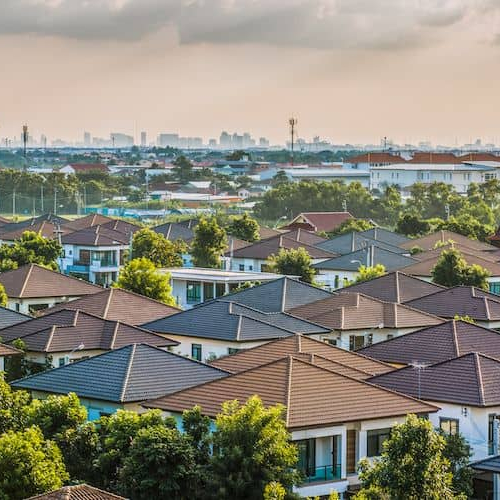What are zoning laws and how do they work?
Contributed by Karen Idelson, Tom McLean
Apr 17, 2025
•4-minute read
If you’re a homeowner with dreams of remodeling your house or even using it as a location for a business as well as your residence, you’ll need to check your city’s zoning laws to find out what’s allowed in your area. This patchwork of regulations affects everything from trailer parks to power plants. Let’s do a deep dive on these laws below.
What are zoning laws?
In short, zoning laws decide what types of buildings can be built on a property, how those buildings may or may not be expanded in the future, and how the buildings can generally be used there. Can a developer build condos downtown? Will an office building pop up in your single-family residential neighborhood? Each area of land, or zone, has set rules and regulations created by a government or municipality to answer these questions.
In addition to the types of buildings allowed, zoning laws also can limit the size, shape, and scale of buildings on the property. Even the construction of something as simple as a white picket fence may involve zoning if it stands taller than a set height or enters the public right-of-way.
Zoning laws are different from homeowners association rules. Zoning laws are made by the local government in a particular area and they regulate all the properties in an that space. HOA rules only apply to the community that’s overseen by that HOA.
What is the purpose of zoning?
Zoning guides and limits development. The first zoning law was put in place in New York City in 1916 in response to a 42-story skyscraper lowering the property value of nearby buildings. This was the first of a new slate of laws designed to control nuisance structures, loud noise levels, and excessive traffic.
Today, zoning ordinances play a major role in all sorts of property usage. They help protect natural and historical resources. They can even improve the view from your front window by preserving access to natural light and privacy.However, not all zoning laws are equal. For example, some residential zones may block the construction of polluting factories for miles around. Others may allow them just across the street. Be smart and stay ahead of the curve by researching the regulations in your area.
How do zoning laws work?
Your local government, municipal corporation, or county makes the zoning laws that impact your zoning district. If you want to develop a building, it must meet that zone’s requirements.
For instance, the zoning district may serve as a single-use or mixed-use zone.
- Single-use zones allow only one type of building on a piece of land, such as residential homes.
- Mixed-use zones allow multiple types of buildings on a piece of land, such as both residential homes and commercial offices.
Changes and amendments to zoning laws
Zoning laws aren’t set in stone. Over time, your municipality may change certain restrictions to accommodate new needs of the community.
In addition, you may receive an exception to a zoning law. Let’s say you can’t abide by your property setback (that’s the distance you can build from your property line) because there’s a hill in your backyard. Or maybe the shape of the street makes it impossible to build your parking space in an accepted location.
Apply for a variance with your local zoning board and you might receive permission to ignore certain restrictions that others must abide by. That’s good news for property owners with atypical geography. Reach out to your local government to learn the process.
Types of zoning restrictions
You now have the basics down about zoning laws. Let’s talk about the different types of zoning restrictions.
Residential
Home takes many forms. Your local government will often set specific zones for these varying types of residential dwellings. Residential zones may be designated for these housing units:
- Single-family residences
- Suburban homesteads
- Apartments
- Trailer parks
- Co-ops
- Condos
- Home-based businesses
A good neighborhood feels connected, which is why the zoning ordinance may designate common items for each residence, such as:
- The kind, and number, of animals allowed at residences, if any
- Encumbrances such as the number of structures allowed on properties
- The allowance of placements of manufactured homes
- Whether or not a multifamily home can be built on properties
Commercial
Businesses can operate in buildings inside commercial zones. These commercial units include:
- Office buildings
- Shopping centers
- Hotels
- Nightclubs
- Restaurants
- Vacant land with the potential for business development
The municipality may also establish laws that enforce:
- The proximity of certain business types to others
- Parking availability
- The maximum building height
Industrial
While also used for business, industrial buildings receive separate industrial zones. Because of their impact on noise levels or air quality, municipalities often try to place them far from residential zones. These buildings include:
- Warehouses
- Manufacturing facilities
- Airports
- Storage facilities
Historic
Cities with storied pasts may set up historic zones. These help protect older buildings from modern-day interferences, and tax deductions may further ensure their survival.
Agricultural
A municipality with farms may designate an agricultural zone. With special protections put in place, farming communities can operate without the fear of losing their land to sprawling urbanization.
Zoning laws FAQs
Now for some frequently asked questions about zoning laws.
How can zoning laws be beneficial to a city’s residents?
You want a home that offers both comfort and financial growth. By carefully designating land for specific purposes, you won’t have to worry about your neighborhood’s charm and value changing when land developers with opposing goals move in.
Can a property be zoned both commercial and residential?
Yes, a zone can include commercial and residential buildings. These are called mixed-use properties, which differ from single-use properties.
How do I find out what my property is zoned?
If you want to find out how your property is zoned, contact your local government. Zoning maps on your local government’s website may also provide what you’re looking for.
The bottom line: Zoning laws influence property use
Zoning laws may influence how you’re allowed to use your property, what you can build on a piece of land, and even how you expand an existing building on a property. If you want to use a property or building in a certain way, it pays to become familiar with the zoning laws in that area.
Take the next step by starting an application with Rocket Mortgage® to find the right property for the right budget.

Michael Rosenthal
Michael Rosenthal brings over a decade's worth of experience writing for finance, tech, education, and entertainment. He earned his bachelor’s in writing and a certificate in public & professional writing from the University of Pittsburgh along with a master’s in television production from Boston University.
His previous work includes developing personal finance education for a Fortune 500 company and articles for various mortgage lenders. When he’s not writing for Rocket Mortgage, Michael spends his time fixing up his well-aged home in Los Angeles one leaky sprinkler at a ti
Related resources

7-minute read
What are real estate property rights, and why do they matter?
Property rights determine your control over your home, land, and more. Learn the types of property rights in real estate and what each means for homeowners.
Read more

6-minute read
Restrictive covenants explained
Restrictive covenants are rules in the deed that limit how the homeowner can use their property. Learn more about these rules and how they may affect you.
Read more

4-minute read
Property lines: Everything you need to know
Property lines mark the end of one owner’s property and the beginning of their neighbor's land. Learn more about them and how to find yours.
Read more